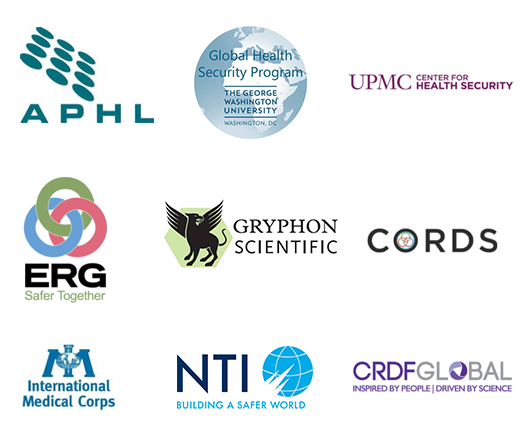The Global Health Security Agenda (GHSA) is an international initiative involving the United States, over 40 other nations, international organizations and private stakeholders who are committed to accelerating progress in global health security and prioritizing internationally the goals of prevention, detection, and response to infectious disease infection.
Ten countries serve as an international governmental steering committee to establish sustained efforts in international implementation of the Agenda though the Action Packages. The government of Finland is the current chair of the GHSA Steering Group.
The Elizabeth R Griffin Foundation is committed to the vision of the Global Health Security Agenda to make the world safe and secure from infectious diseases. In sharing this vision, ERGF aligns its program interests to the nine objectives that define the Prevent - Detect - Respond foci of the program.
NGOs play a critical role in successful implementation of and sustained efforts towards the goals of the GHSA. They come from a variety of sectors and disciplines to assist nations in preventing, detecting, and responding to infectious disease events. A group of 8 U.S.-based nongovernmental stakeholders has established the Global Health Security Agenda Leadership Consortium to establish a global affinity network for global health security and to enhance communication between non-governmental stakeholders and governments worldwide. Finland is committed to include nongovernmental stakeholders in GHSA-relevant activities in the overarching GHSA initiative.
The Elizabeth R Griffin Foundation is a founding member of the Global Health Security Agenda Leadership Consortium in the U.S. and serves in a collaborative role with nine other founding organizations/institutions:
- Association of Public Health Laboratories (www.aphl.org)
- CORDS (www.cordsnetwork.org)
- CRDF Global (www.crdfglobal.org)
- Georgetown University (www.georgetown.edu)
- George Washington University (www.gwu.edu)
- Gryphon Scientific (www.gryphonscientific.com)
- International Medical Corps (www.internationalmedicalcorps.org)
- Nuclear Threat Initiative (NTI) (www.nti.org)
Updates on the consortium and its activities, as well as the GHSA, will be will be placed on this site for additional information. Please contact Jim Welch at jwelch@ergriffinresearch.org if you have interest in being a member of the affinity network.
Global Health Security Agenda Objectives
- Prevent the emergence and spread of antimicrobial drug resistant organisms and emerging zoonotic diseases, and strengthen international regulatory frameworks governing food safety. Act to reduce the individual and institutional factors that enable antimicrobial resistance and the emergence of zoonotic disease threats; increase surveillance and early detection of antimicrobial resistant microorganisms and novel zoonotic diseases; measurably enhance antimicrobial stewardship; strengthen supply chains; promote safe practices in livestock production and the marketing of animals; and promote the appropriate and responsible use of antibiotics in all settings, including developing strategies to improve food safety.
- Promote national biosafety and biosecurity systems. Promote the development of specific multi-sectoral approaches in countries and regions for managing biological materials to support diagnostic, research and biosurveillance activities, including identifying, securing, safely monitoring and storing dangerous pathogens in a minimal number of facilities while advancing global biosurveillance, and frameworks to advance safe and responsible conduct.
- Reduce the number and magnitude of infectious disease outbreaks. Establish effective programs for vaccination against epidemic-prone diseases and nosocomial infection control.
- Launch, strengthen and link global networks for real-time biosurveillance. Promote the establishment of monitoring systems that can predict and identify infectious disease threats; interoperable, networked information-sharing platforms and bioinformatics systems; and networks that link to regional disease detection hubs.
- Strengthen the global norm of rapid, transparent reporting and sample sharing. Strengthen capabilities for accurate and transparent reporting to the WHO, OIE, and FAO during emergencies, with rapid sample and reagent sharing between countries and international organizations.
- Develop and deploy novel diagnostics and strengthen laboratory systems. Strengthen country and regional capacity at the point-of-care and point-of-need to enable accurate, timely collection and analysis of information, and laboratory systems capable of safely and accurately detecting all major dangerous pathogens with minimal biorisk.
- Train and deploy an effective disease surveillance workforce. Build capacity for trained and functioning biosurveillance workforce, with trained disease detectives and laboratory scientists.
- Develop an interconnected global network of Emergency Operations Centers and multi-sectoral response to biological incidents. Promote establishment of Emergency Operations Centers; trained, functioning, multisectoral rapid response teams, with access to a real-time information system; and capacity to attribute the source of an outbreak.
- Improve global access to medical and non-medical countermeasures during health emergencies. Strengthen capacity to produce or procure personal protective equipment, medications, vaccines, and technical expertise, as well as the capacity to plan for and deploy non-medical countermeasures. Strengthen policies and operational frameworks to share public and animal health and medical personnel and countermeasures with partners.
PREVENT
DETECT
RESPOND

